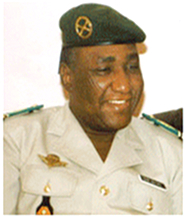Daouda Malam Wanké | |
|---|---|
 Wanké in 1999 | |
| 6th President of Niger (as Chairman of the National Reconciliation Council of Niger) | |
| In office April 11, 1999 – December 22, 1999 | |
| Prime Minister | Ibrahim Hassane Mayaki |
| Vice President | Soumana Zanguina |
| Preceded by | Office vacant |
| Succeeded by | Mamadou Tandja |
| De facto leader of Niger[1] | |
| In office 9 April 1999 – 11 April 1999 | |
| President | Office vacant |
| Prime Minister | Ibrahim Hassane Mayaki |
| Preceded by | Ibrahim Baré Maïnassara (as president of Niger) |
| Succeeded by | Himself (as 6th president of Niger (as Chairman of the National Reconciliation Council of Niger)) |
| Personal details | |
| Born | May 6, 1946 near Niamey, Niger, French West Africa |
| Died | September 15, 2004 (aged 58) Niamey, Niger |
| Political party | Independent (Affiliated with the MNSD–Nassara) |
| Children | 4[2] |
Daouda Malam Wanké (May 6, 1946 – September 15, 2004) was a military and political leader in Niger. He was a member of the Hausa ethnic group.
Wanké's year of birth is disputed. Many sources claim it is 1954[3][4] while others suggest 1946.[5]
He hold many other offices.[6][7]
Biography
[edit]He was born in Yellou, a town near Niger's capital, Niamey. He entered the Niger military, rising to the rank of Major. On April 9, 1999, Wanké led a military coup in which President Ibrahim Baré Maïnassara, who himself had come to power in a military coup, was assassinated.[8][9] For two days there was much political uncertainty in Niger, as the prime minister, Ibrahim Hassane Mayaki and several others also had claims on the presidency. On April 11, 1999, Wanké became president,[10] heading a transitional government[11] that promised to hold elections later that year.[12]
Wanké's government fulfilled its promise, and turned over power to the newly elected president, Mamadou Tandja, in December 1999. Wanké subsequently suffered from various health problems, including cardiovascular troubles and high blood pressure. During the last months of his life, he traveled to Libya, Morocco and Switzerland for medical treatment. He died in Niamey. He is survived by a wife and three children.
References
[edit]- ^ "Les Anciens Présidents et Chefs d'Etat : Daouda Malam WANKE". Archived from the original on 18 November 2015.
- ^ "NIGER: The new military leader". 13 April 1999.
- ^ Niger.
- ^ "NIGER: The new military leader". 13 April 1999.
- ^ "Wanké, Daouda Malam", Rulers.
- ^ "NIGER: The new military leader". 13 April 1999.
- ^ "Biographie du président de la République du Niger Daouda Malam Wanké".
- ^ Niger: The people of Niger have the right to truth and justice, April 6, 2000
- ^ Amnesty International. President Mainassara: A profile, BBC, April 9, 1999.
- ^ "Presidential guardsman named Niger leader".
- ^ "Presidential guardsman named Niger leader following assassination".
- ^ Niger: A copybook coup d'etat, April 9, 1999, BBC. Military controls Niger, April 10, 1999, BBC.